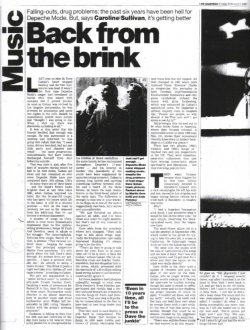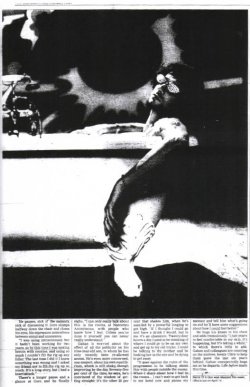- Joined
- Aug 15, 2019
- Messages
- 7,493
- Reaction score
- 143
- Points
- 63
Back From The Brink
[The Guardian, 7th February 1997. Words: Caroline Sullivan. Pictures: Anton Corbijn.]


Falling-outs, drug problems: the past six years have been hell for Depeche Mode. But, says Caroline Sullivan, it’s getting better.
Last year on May 28, Dave Gahan’s heart stopped beating and for two minutes he was dead. It wasn’t the first time Depeche Mode’s singer had overdosed on heroin (this time mixed with cocaine), but it proved pivotal. As soon as Gahan was revived by Los Angeles paramedics, he was arrested for possession and spent two nights in the cells. Bailed, he immediately scored more heroin and “thought I was going to die. When I shot up, there was absolutely no feeling at all.”
It was at this point that his friends decided that enough was enough. He was summoned to a meeting and informed he was going into rehab that day. “I went home, did my last little deal, had my last little party and checked into rehab” – the same programme, coincidentally, that Kurt Cobain discharged himself from days before his suicide. [1]
That was June 6, and, after five days of seizures during which he had to be tied down, Gahan got clean and has remained so ever since. Depeche Mode have just completed their 12th album, Ultra – in many ways one of their finest – and the band’s future looks brighter than at any time since 1990, when Gahan acquired his habit. But the 34-year-old singer, who has spent his entire adult life in the band, is still in a delicate position – well on the road to recovery, yet not so far removed from his addiction that he can discuss it without discomfort.
A number of songs on Ultra, which is even more dramatically doomswept that its five million-selling predecessor, Songs Of Faith And Devotion, seem to allude to his struggle. The claustrophobia-inducing first single, Barrel Of A Gun, is pitiless: “This twisted tortured mess… longing for some rest.” But principal songwriter Martin Gore maintains: “It’s only partly about the hell Dave’s been through. It’s written from my perspective… I have a problem with life, too.” He admits to being a heavy drinker. “You drink 15 pints a night and take your clothes off and cause a scene,” according to Gahan.
The pair are sequestered in a “junior terrace suite” in London’s arty-posh Covent Garden Hotel, finishing a week of promotion for Barrel Of A Gun, their first single in three years. Keyboardist Andy Fletcher is on phone interview duty in another room and third keyboardist Alan Wilder left unamicably in 1995, citing “dissatisfaction with the group’s working practices”.
Darkness is falling as they face the 10th and last interview of the day. Gore looks a bit wearier than in his photos but is recognisable by his nimbus of blond candyfloss – the same hairdo he has maintained throughout Depeche’s 17-year career – and his interest in leather (the miniskirts of his youth have been supplanted by more becoming trousers). Gahan is skinny, long haired and sporting something half way between stubble and a beard. Of the three Modes, he bears the least resemblance to the fresh-faced infant of the early days. The difference is enough to stop you in your tracks. As he flops on to one of the suite’s suggestively large beds, he’s restive and uncomfortable.
“We just finished an album against all odds, and I’ve been clean and sober for eight months, but that’s not of any interest to the press.”
Gore adds from the armchair where he’s slumped, “They only want to talk about drugs, especially the English press. I get really depressed thinking it’s always going to be like this.”
“That’s all they’re going to talk about for ever. Even in 10 years’ time, all I’ll be to them is Dave the junkie,” echoes Gahan. His LA-via-Basildon tones are doleful. Understandable, but not altogether fair to the press, which, presented with the spectacle of a 30-million-selling band trying its best to self-destruct, could hardly ignore it.
All three members had lifestyles unhealthy enough to rival even Elvis Presley’s. Even Fletcher, ginger-haired and clerkly, had a revelry-induced breakdown 10 months into the Songs Of Faith And Devotional Tour. That epic slog will probably be immortalised as the first to have had its own drug dealer and therapist.
That they sank to such depths is still hard to comprehend. The Depeche Mode that formed in Essex in 1980 were cuddly purveyors of plinky electropop that won them hits but not respect. All that changed in 1981 when Gore replaced Vince “Erasure” Clarke as songwriter. His partiality to both German experimentalists Einsturzende Neubaten and religious symbolism imbued the music with grim foreboding, which was enhanced by Gahan’s sepulchral voice. He imparted a certain majesty even to couplets like “People are people so why should it be / That you and I get along so aw-ful-ly?”
Surprisingly, this turned out to be what broke them in America, where they became colossal. A memorable scene in their 1989 tour film, 101, shows their accountant literally knee-deep in dollars backstage at a California concert.
Their last two albums, 1990’s Violator and 1993’s Songs Of… reached two and one respectively in the UK charts. They were relentless, saturnine collections that saw Gore waxing iconoclastic about spirituality and obsessions – not your everyday pop fare.
[The Guardian, 7th February 1997. Words: Caroline Sullivan. Pictures: Anton Corbijn.]
Newspaper feature interviewing Dave Gahan, with minimal contribution from Martin, about the upheavals of the last couple of years of his life. The focus is somewhat more on Dave's state of mind in the time since his recovery than the gory details of his addiction, and the length of the article makes it a suitable primer for someone who doesn't want to pick over every last detail of this unpleasant chapter in Mode history.
" That’s all they’re going to talk about for ever. Even in 10 years’ time, all I’ll be to them is Dave the junkie. "
Apologies for the poor quality of the scanned pages: this is due to them being printed from microfilm copies of the original newspaper.


Falling-outs, drug problems: the past six years have been hell for Depeche Mode. But, says Caroline Sullivan, it’s getting better.
Last year on May 28, Dave Gahan’s heart stopped beating and for two minutes he was dead. It wasn’t the first time Depeche Mode’s singer had overdosed on heroin (this time mixed with cocaine), but it proved pivotal. As soon as Gahan was revived by Los Angeles paramedics, he was arrested for possession and spent two nights in the cells. Bailed, he immediately scored more heroin and “thought I was going to die. When I shot up, there was absolutely no feeling at all.”
It was at this point that his friends decided that enough was enough. He was summoned to a meeting and informed he was going into rehab that day. “I went home, did my last little deal, had my last little party and checked into rehab” – the same programme, coincidentally, that Kurt Cobain discharged himself from days before his suicide. [1]
That was June 6, and, after five days of seizures during which he had to be tied down, Gahan got clean and has remained so ever since. Depeche Mode have just completed their 12th album, Ultra – in many ways one of their finest – and the band’s future looks brighter than at any time since 1990, when Gahan acquired his habit. But the 34-year-old singer, who has spent his entire adult life in the band, is still in a delicate position – well on the road to recovery, yet not so far removed from his addiction that he can discuss it without discomfort.
A number of songs on Ultra, which is even more dramatically doomswept that its five million-selling predecessor, Songs Of Faith And Devotion, seem to allude to his struggle. The claustrophobia-inducing first single, Barrel Of A Gun, is pitiless: “This twisted tortured mess… longing for some rest.” But principal songwriter Martin Gore maintains: “It’s only partly about the hell Dave’s been through. It’s written from my perspective… I have a problem with life, too.” He admits to being a heavy drinker. “You drink 15 pints a night and take your clothes off and cause a scene,” according to Gahan.
The pair are sequestered in a “junior terrace suite” in London’s arty-posh Covent Garden Hotel, finishing a week of promotion for Barrel Of A Gun, their first single in three years. Keyboardist Andy Fletcher is on phone interview duty in another room and third keyboardist Alan Wilder left unamicably in 1995, citing “dissatisfaction with the group’s working practices”.
Darkness is falling as they face the 10th and last interview of the day. Gore looks a bit wearier than in his photos but is recognisable by his nimbus of blond candyfloss – the same hairdo he has maintained throughout Depeche’s 17-year career – and his interest in leather (the miniskirts of his youth have been supplanted by more becoming trousers). Gahan is skinny, long haired and sporting something half way between stubble and a beard. Of the three Modes, he bears the least resemblance to the fresh-faced infant of the early days. The difference is enough to stop you in your tracks. As he flops on to one of the suite’s suggestively large beds, he’s restive and uncomfortable.
“We just finished an album against all odds, and I’ve been clean and sober for eight months, but that’s not of any interest to the press.”
Gore adds from the armchair where he’s slumped, “They only want to talk about drugs, especially the English press. I get really depressed thinking it’s always going to be like this.”
“That’s all they’re going to talk about for ever. Even in 10 years’ time, all I’ll be to them is Dave the junkie,” echoes Gahan. His LA-via-Basildon tones are doleful. Understandable, but not altogether fair to the press, which, presented with the spectacle of a 30-million-selling band trying its best to self-destruct, could hardly ignore it.
All three members had lifestyles unhealthy enough to rival even Elvis Presley’s. Even Fletcher, ginger-haired and clerkly, had a revelry-induced breakdown 10 months into the Songs Of Faith And Devotional Tour. That epic slog will probably be immortalised as the first to have had its own drug dealer and therapist.
That they sank to such depths is still hard to comprehend. The Depeche Mode that formed in Essex in 1980 were cuddly purveyors of plinky electropop that won them hits but not respect. All that changed in 1981 when Gore replaced Vince “Erasure” Clarke as songwriter. His partiality to both German experimentalists Einsturzende Neubaten and religious symbolism imbued the music with grim foreboding, which was enhanced by Gahan’s sepulchral voice. He imparted a certain majesty even to couplets like “People are people so why should it be / That you and I get along so aw-ful-ly?”
Surprisingly, this turned out to be what broke them in America, where they became colossal. A memorable scene in their 1989 tour film, 101, shows their accountant literally knee-deep in dollars backstage at a California concert.
Their last two albums, 1990’s Violator and 1993’s Songs Of… reached two and one respectively in the UK charts. They were relentless, saturnine collections that saw Gore waxing iconoclastic about spirituality and obsessions – not your everyday pop fare.
[1] - Dave Gahan / Kurt Cobain themed coincidences, #2: Kurt Cobain received his first guitar as a 14th birthday present on the same day that Depeche Mode released their first single, Dreaming Of Me: 20th February 1981.

